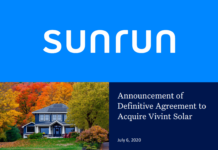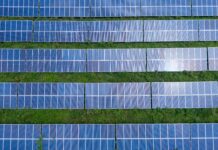Vince Font
![Gunfleet_Sands_Offshore_Wind_Farm_-_geograph.org.uk_-_2091181[1].jpg](http://www.altenergystocks.com/wp-content/uploads/2017/08/Gunfleet_Sands_Offshore_Wind_Farm___geograph_org_uk___2091181_1_.jpg)
Siemiens wind turbines at the Gunfleet Sands Offshore Wind Farm 4 km from Gunfleet Sand, Essex, Great Britain. Siemens AG is selling its solar business, and will focus its renewable energy efforts on hydro power and wind energy. Siemens is an established “clear market leader for offshore wind power” according to Managing Board member Michael Süß.
Photo credit: Ashley Dace |
Citing slow growth, low profit and high cost, Siemens AG (NYSE:SI) announced that it would be selling its solar energy business as part of a larger strategy to reorganize the company’s overall stake in renewable energy. According to Bloomberg, Siemens also plans to end its involvement in DESERTEC, a joint venture it entered into in late 2011, which would build an immense network of solar farms in the Sahara desert.
“Due to the changed framework conditions, lower growth and strong price pressure in the solar markets,” Siemens said in a statement, “the company’s expectations for its solar energy activities have not been met.”
Already in talks with prospective buyers, Siemens unveiled a plan earlier in October to develop an optimized infrastructure through cost reduction and the strengthening of its core activities. Indicating the company’s continued commitment to the pursuit of renewable energy, Siemens said it plans to push further into developments in wind and hydro power, which have so far proven more profitable for the company.
Michael Süß, member of the Managing Board of Siemens AG and CEO of its Energy Sector, said, “the importance of renewable energies in the global power mix will continue to grow and hydro power and wind energy will remain the major renewable contributors. Our renewable energy activities will be focused on these two areas.” Süß added that Siemens is an established “clear market leader for offshore wind power farms” and said the company is “making good progress in onshore business.”
Despite the intended dissolution of its solar division, Siemens said it would continue to manufacture products for solar thermal and photovoltaic power plants. These products will include generators, steam turbines, control systems, and grid technology. Siemens has also pledged to continue operations of its solar thermal energy and photovoltaic business units until both have been sold, ensuring continuity of business for its existing contractual obligations.
Ingo-Martin Schachel, an analyst with Commerzbank AG in Frankfurt, told Bloomberg that the reasoning behind the decision by Siemens to divest its solar business activities was “obvious” and added: “Solar is no core business and no core competency of Siemens. The growth prospects for these markets have deteriorated such that there is really no reason to remain active here.”
Calling solar thermal energy “a hard sell,” head of solar research for Bloomberg New Energy Finance Jenny Chase said, “This is more evidence that there is no such thing as too big to fail at the solar industry.”
Siemens acquired Israeli company Solel Solar Systems and Italian company Archimede Solar Energy in 2009, but operating profits in its renewable energy division within the last year have plummeted 34 percent. Siemens presently employs 680 employees in its solar business, but its wind power division employs over 7,000.
The move by Siemens will not be seen as a surprise by many solar industry analysts. Shyam Mehta, Senior Solar Analyst with GTM Research recently told RenewableEnergyWorld.com that he expects many diversied firms will abandon solar in the next year. “I would say we would see a lot more market exits in terms of plant closures or in terms of divestment from PV from diversified firms or insolvencies,” Mehta said. “We expect a lot more over the next year.”
Vince Font is a professional freelance writer specializing in the fields of renewable energy, high tech, travel, and entertainment. Read his blog at www.vincefont.com or follow him on Twitter @vincefont.
This article was originally published on RenewableEnergyWorld.com, and is republished with permission.





